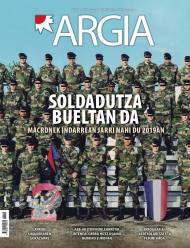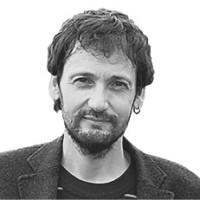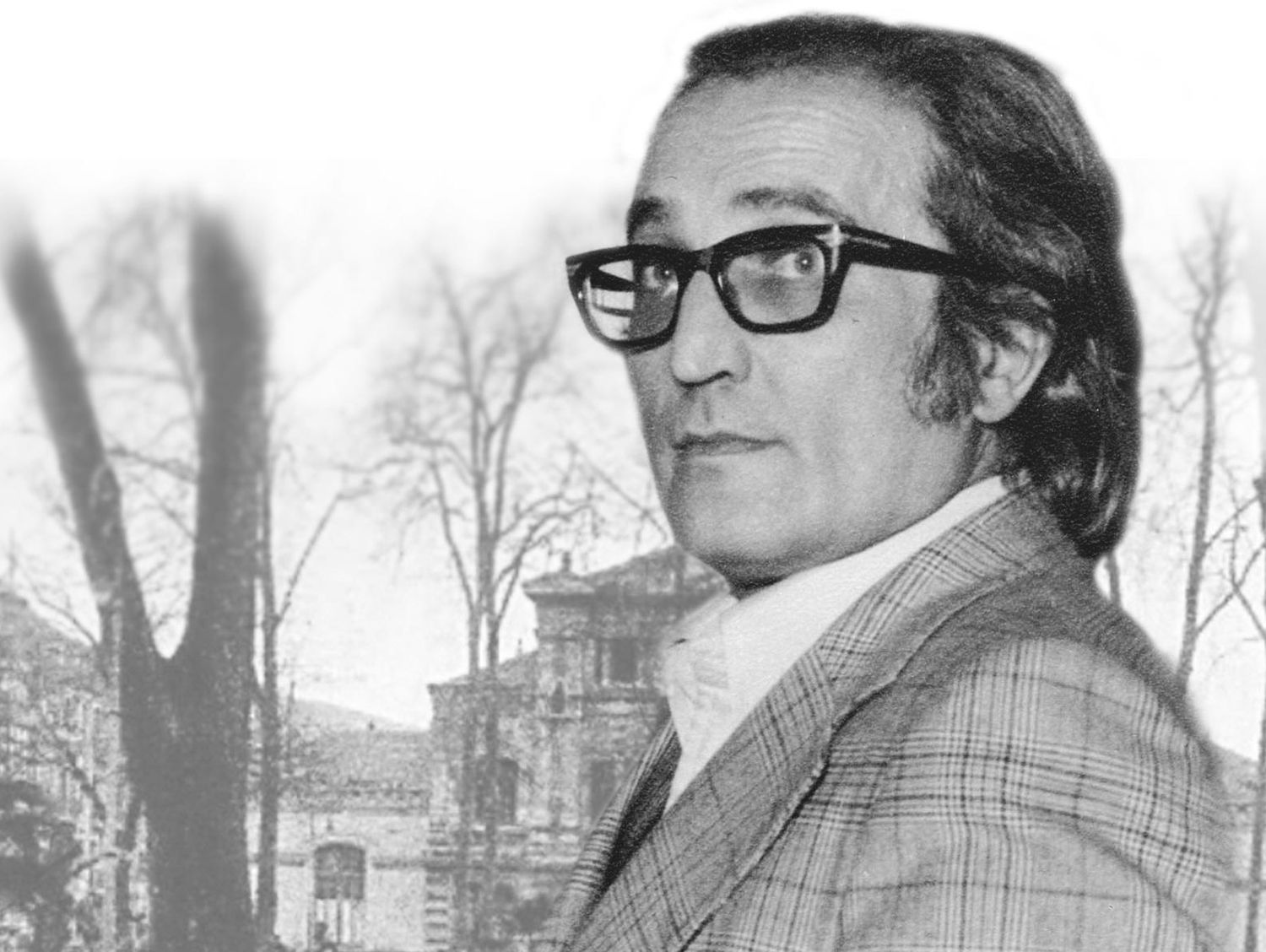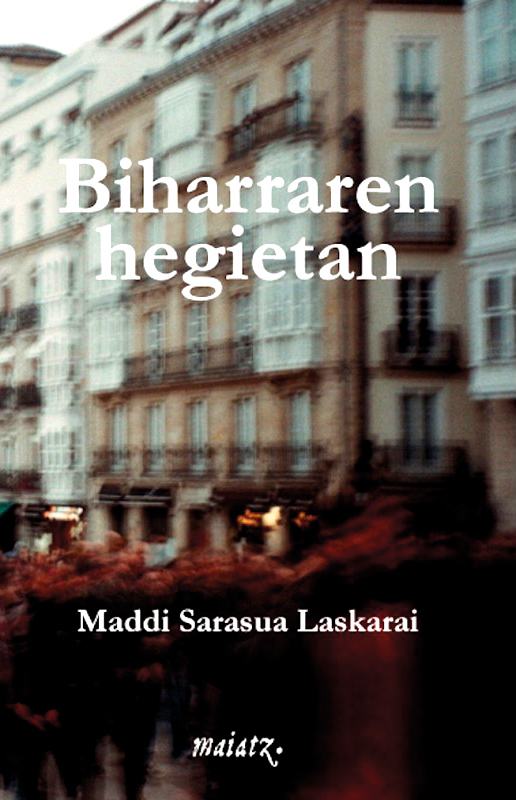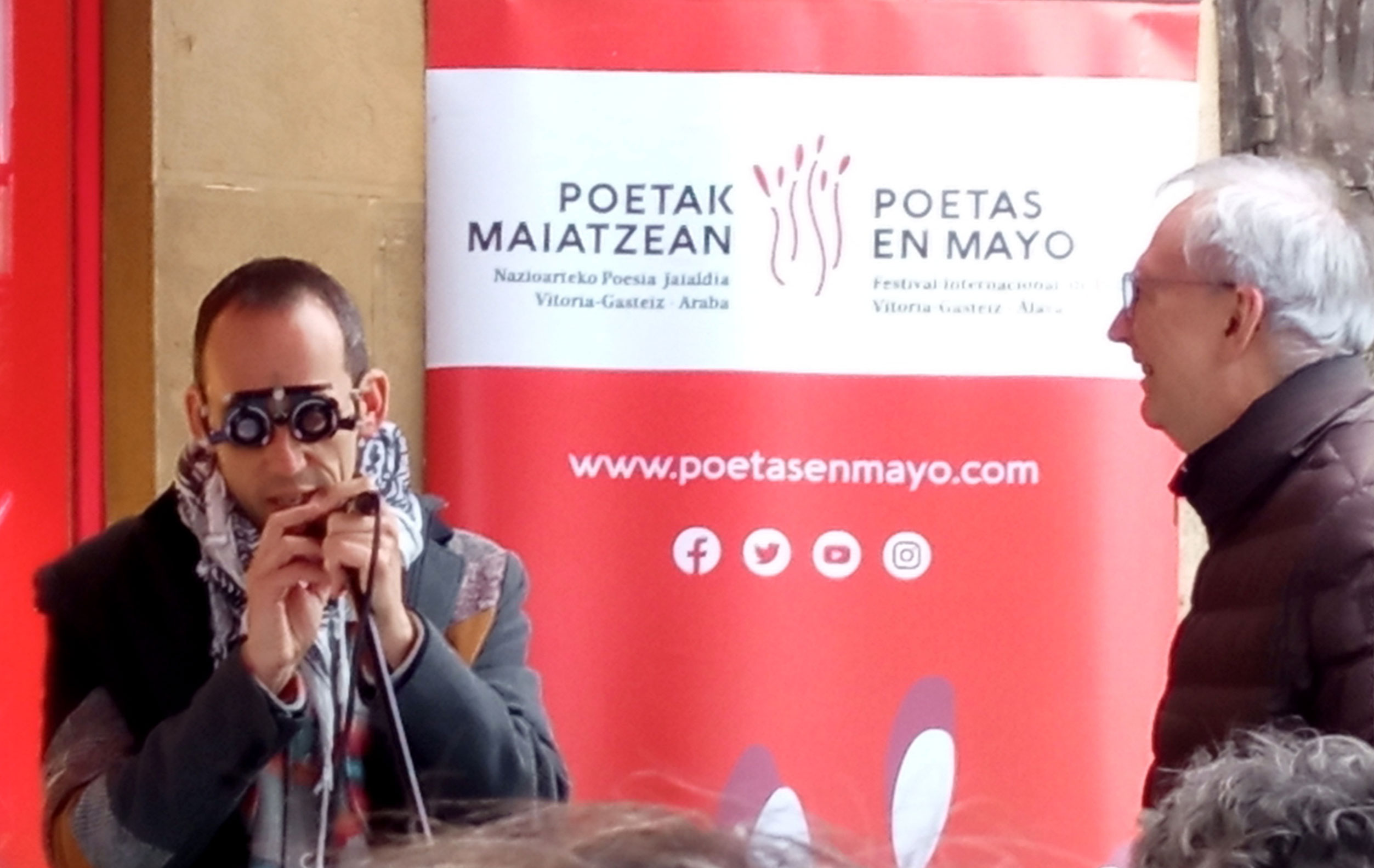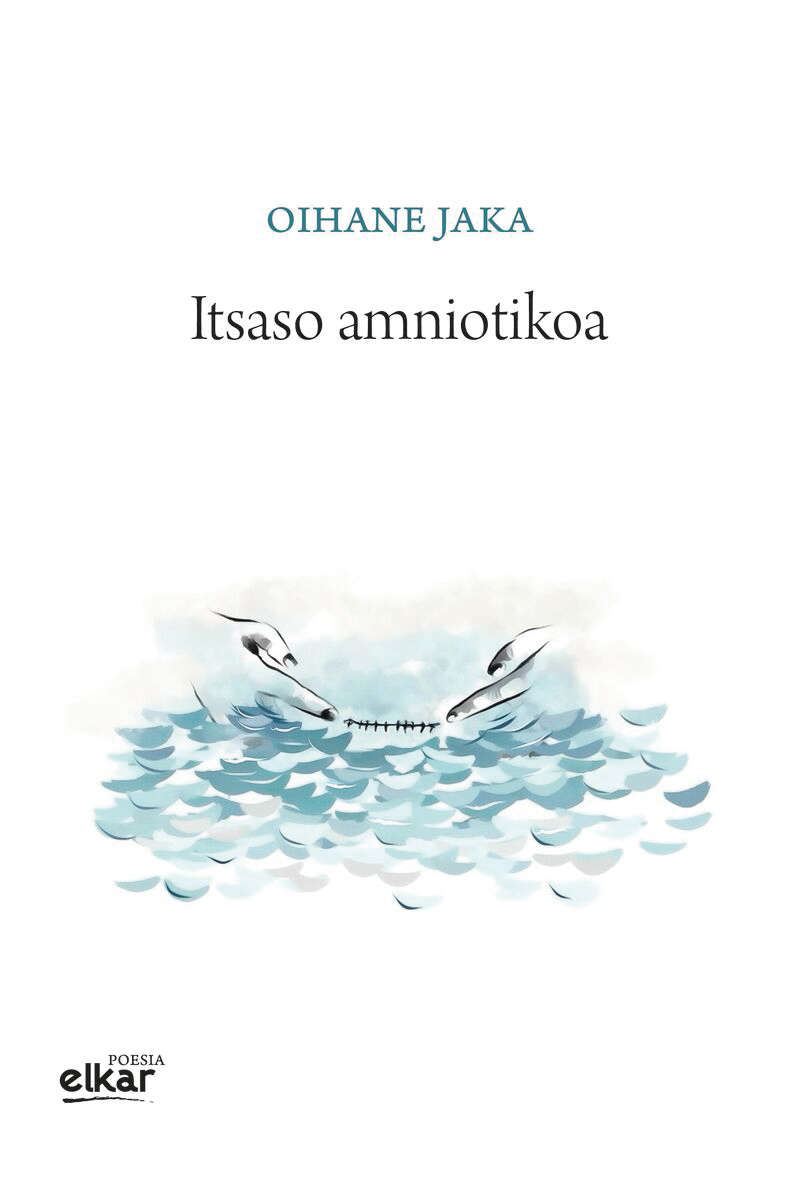"A poem has to hurt"
- You'll see them mostly in gaztetxes. In bars, in public spaces, in meetings of some popular movement, but always outside official literary circuits. Four years ago the brothers Aimar and Eñaut Uribelsalgo began with the performance of Poor Siak. At first, Fanzine and his poems were collected on a disk. There is no choice but to turn to the direct ones to keep up with the future.
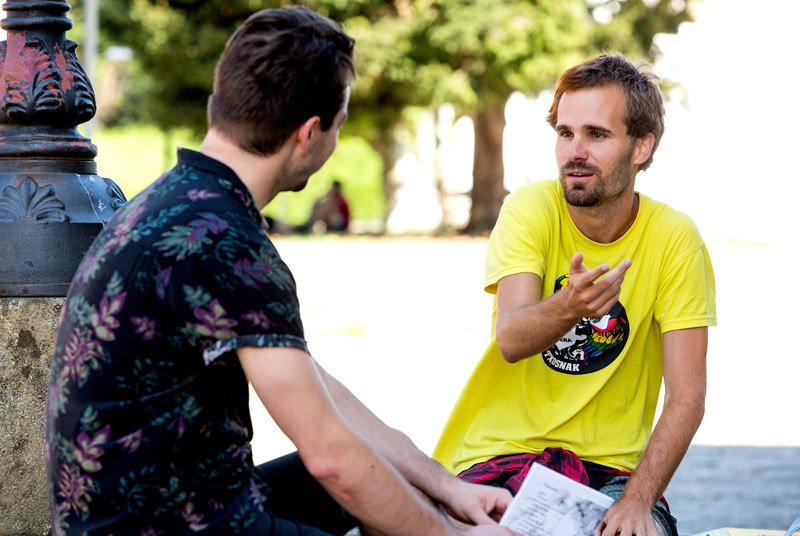
“It’s the winter of 2014 and we’re not entirely happy” is the first poem that starts with fanzine Zoria. It's been four years since then. Has anything changed?
Everything remains the same. We will no longer be completely happy or totally miserable – that is what the poem ends – unless we are about to commit suicide once. One thing has increased since: the need to be happy. Pressure is brutal.
Has your performance changed in these four years?
In some things yes, in others not so much. Musically, we've improved something, because my brother has learned to play the guitar. From an aesthetic point of view, we remain the same: he goes up on stage with a Soviet military appearance and I, disguised as a Parisian, as if he were a Bohemian poet. Poems have also changed, of course. We have included a lot of news in the action. Most of us who read now are not in fanzine.
“I haven’t eaten a lot of poetry, but when I do the poop there is also a bad smell, please,” you say, below the common poetry poems.
“The need to be happy has become more acute,
there is
enormous pressure”
I've never been a poetry reader. Not now either. Jorge Oteiza said that in order to exercise an artistic discipline it is essential to know what others have done, and then to build or destroy it. It's not my case, and I probably could get angry with Oteiza. I always tried. If something I like, I like authors who give a punk touch to poems. Bukowski, for example, tells very elegant Chinese stories. A poem has to hurt, it has to make you feel something in your bowels. It has to discover its contradictions. Yesterday someone said to me: "It's curious, uncle. We have all been criticizing from the stage, and yet we liked it, we applaud it.” That's what we want to get, touch something.
Anyway, I wouldn't say you just cast the sting out. All poems are crossed by a rather self-critical tone.
The separation between me and the audience is that I recite and they listen. Outside, we're similar. We have made similar reflections, we are in similar movements, we have similar practices ... When I say something, I say something about everyone. Whoever comes to hear us will not hear much of the butterflies or the flowers.
Instead, “patriarchy”, “capitalism”, “middle class”...
These are common concepts in the environments in which we move. That is our area, and that is where those who come to listen to us come. We've done a lot of performances, and we realize that the biggest feeling we get with this type of audience: people from popular movements, sensible to social changes, who believe in participation and in horizontality, feminist, well studied, better if you've gone through college -- well, if you're an engineer, maybe not -- middle class -- between quotation marks, it's a pitiless concept -- who's read some essays books, Euskaldred.
Literate?
If we do a survey, I think literary circles would be a minority. Once we did a performance at the Casa de Cultura de Oñati, in the same library. Most of those who came – except some known – were women. And I think those women relate poetry to something other than our raw, acidic language -- and, well, what was he saying?
That there are few literates among your followers.
Well, literature is mostly understood as the novel, the poetry and those things. On the contrary, the one who has not read the essay, the one who does not make many socio-political reflections, will not understand us much.
I haven't seen you at festivals or other events in the literary world, so I mentioned it to you.
It's true, I never thought about it. We work in gaztetxes, bars, parties, txosnas, encounters... but the literature festivals have not called us. I don't know why, maybe we don't.

If you look at fanzine, there are more names. Kropotkin, Stalin, Foucault… The influence of communist tradition is evident.
Yes, among others. You go into the Batxillerero movements, you read a thousand messages against capitalism, you don't understand anything, but you know there are alternatives, be communist, be anarchist... I realized there were people making proposals to change all of this, and I really wanted to discover those worlds. I started reading classic books by Marxists, by anarchists ... Then, little by little, also other things: sociology issues, history, philosophy, economics -- that's what I've fed myself. I'm a very rational guy, and that world is my world. On the contrary, I feel a little lost. For example, as far as feelings or human relations are concerned, I have great shortcomings. I look a little bit like Sheldon Cooper, from the Big Bang Theory.
Oh, yeah?
Well, the couple says it to me. Sheldon's pretty extremist, but I've got some touches. Lately, I'm trying to take into account feelings and those things instead of being so rational. Care for the heart, etc. When I attended conferences like today [refers to the camp organized by Free Lands], I always went to intellectual activities: conferences, round tables... Now, instead, I'm dedicated to cooking, serving food and things like that. I am very bad for practical things, also for everyday life. I am a man and, of course, he is right. I'm in it and the partner is helping me a lot. You learn a lot through shock, conflict ...
In their actions, a community meets to listen to their poems about their daily practices and values. Can you have some liturgy?
We have a contradiction, the same contradiction as all of these actions: Apprenticeship. We were doing something on the stage and the others were watching. We are active, and most are reserved to be passive, applauded and laughter. There are models that guarantee everyone’s participation, and rethinking the format wouldn’t be bad. From time to time, there are moments of dread when we relate to the public. Yesterday, in a moment, someone said “hoi, hoi, hoi!” –That, that, that!–. And I answered, “I see that in the audience there are skinheads.. quiet, we are in favor of skinheads. Or not.” People had stayed out of the game. We like to provoke listeners. For example, our poem questions the very concept of applauding. He ignores the applause and ends by saying “to see if now you dare to applaud”. We encourage listeners to question what they have to do for themselves.
Is poetry a hammer?
“Art has its importance, but it is not essential for revolution”
I'm not going to say no, but among those who make that speech there's an important component of the ego. Compared to music: The people of Non Servium told him in an interview: “What we do is an instrument of struggle.” I think it's silly to tell you. They like to make music, they have many people saying that they are from Christ, and besides feeling the most Christian, they feel they are militating doing that, “look what we are contributing.” I will not say that artists do not serve at all, but many exaggerate. Art has its importance, but it's not essential for revolution. The importance is elsewhere. Primarily in management. Only with music and radical poetry do you go nowhere.
Do you say that many artists live in a film that they believe themselves?
Look, I've been affected a lot by punk, I still hear a lot. But it's all about the ego. We're all full of fear, we all like to have an identity, to be part of a collective. So, there are people who enter that punk identity, but nothing guarantees that that's why they're self-critical, that they make real change, that they develop personally ... Much of punk has become conservative, both in its content and in its way of doing. You look a little bit, and the question turns on. “What is the point of doing that day?” The people who are walking around are at ease with that. In addition, often everything is very insulting. Some making noise onstage, others below, can't communicate with each other, and in the meantime, be drugged. In this model, we must reflect.
I've read to you that the most consumed culture hides reality.
Movies, literature, plays, poetry, music... A high percentage reproduces values that correspond to the current dominant social model. But well, if we continue to repeat the current formula, perhaps we too will have a time when our commitment will become conservative. In 30 years' time, a new generation of journalists will criticize us by saying that we are conservative. But we're not there yet. So quiet, nothing happens, everything goes well (laughing).
Entrepreneurship is fashionable. The concept has gained strength and has spread far beyond economic vocabulary. Just do it: do it no more. But let us not forget: the slogan comes from the propaganda world. Is the disguise of the word being active buyers? Today's entrepreneurs are... [+]
Spring is usually a promise of a cold winter nose that can come after the landing, and has been annotated several times for sleep. Promise, however, is never a safe spring in a ruined terrain. Not at least if we are talking about change or, in particular, revolution. Maddi... [+]
We opened the poems book by Oihana Jaka and found two deals. One father and another son. It is worth noting for its direct relationship with the poems we will find. The book is structured in three parts:
Hamaika urte, Hamaika hilabete eta Hamaika egun. Number eleven is also... [+]
Yolanda Castaño has been interviewed since she received the Spanish National Poetry Prize. The head of a row from one of them caught my attention because he said the second hardest thing he's ever done is win the prize. And I immediately began to look for what was the hardest... [+]
A few years ago, I wrote a little book about Tene Mujika, which is called Udazken Argitan. When I started doing that biographical essay, I met our protagonist today, Mr. Watson Kirkconnell. In 1928, Kirkconnell published a nice book of European Elect anthology, which included... [+]
I do not remember who I heard that at the end of the month you can only write poetry, if poetry is not your way to the end of the month. Poetry, fortunately or unfortunately, has always been on the periphery of the literary system and the cultural industry. In any case, poets... [+]
Juan Margarita fuse architecture and poetry. They asked about the relationship between both disciplines, in the belief that the unification of these two practices was exceptional. In these cases, she answered that both areas had great similarities, since for Margarita, both the... [+]









